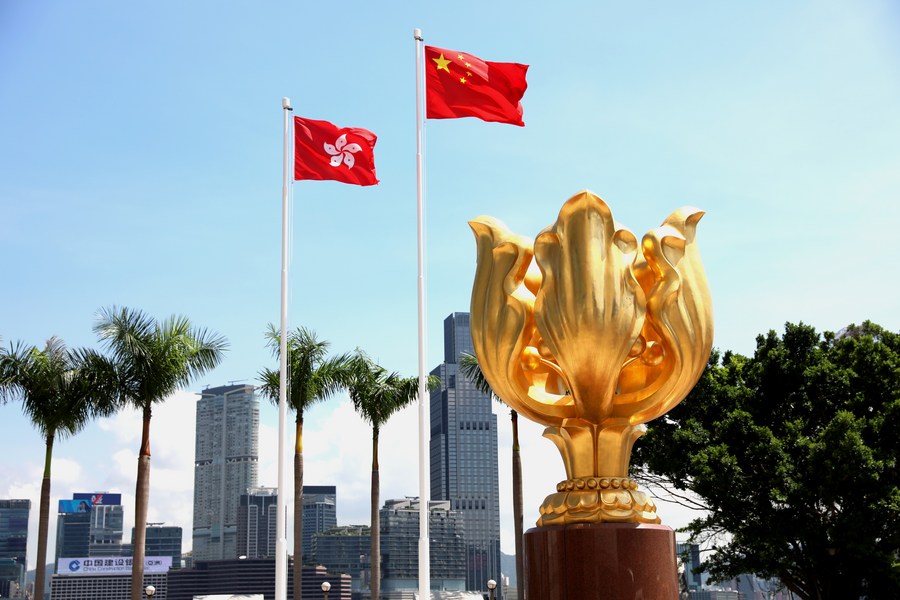


Photo taken on July 14, 2020 shows the Golden Bauhinia Square in south China's Hong Kong. (Xinhua/Wu Xiaochu)
GENEVA, March 1 (Xinhua) -- The national security law in Hong Kong has been a stabilizing force for the city, and stability and order have been restored there, officials said Monday on an online side-meeting during the 46th session of the UN Human Rights Council.
After a video clip at the meeting's beginning that shows great strides in Hong Kong since the national security law was implemented, John Lee Ka-chiu, secretary for security of the Hong Kong Special Administrative Region (HKSAR) government, told the meeting that the effect of the law is "obvious and direct."
"Violence has dropped significantly. Stability and order have been restored. People have returned to their normal life. Business has resumed normal. Economy begins to recover," he said, noting that Hong Kong residents have been enjoying more freedom and rights now than before China resumed exercise of sovereignty over the city in 1997.
China's five-year plan has offered strong support to shore up the city's status as an international financial, shipping and trade center, and under "one country, two systems," the support of the Chinese central government for Hong Kong is all-rounded and wide-ranging, he added.
With order restored by the national security law, and the "one country, two systems" fully ensured, "increasing opportunities at all fronts will happen and grow in HK," he said.
Martin Liao Cheung-kong, member of the Legislative Council of the HKSAR, stressed that in today's world, almost every country has its own national security law.
The national security law in Hong Kong, he said, clearly provides four types of offences that endanger national security, namely secession, subversion, terrorist activities, and collusion with a foreign country or with external elements to endanger national security.
It can be readily seen that the national security law in Hong Kong stipulates very elementary requirements for the protection of national security, when compared with the sophisticated national security regimes of some countries in the West, he said.
"Clearly, the NSL (national security law) is a stabilizing force for HK and provides a congenial platform for business and investment for the entire world," he said.
Henry KC Ho, founder and chairman of the One Country Two Systems Youth Forum, told the meeting that the "one country, two systems" policy is being fully and successfully implemented in Hong Kong.
He stressed that the freedom of speech and peaceful assembly is not in any way abridged in the city, adding, "The only exceptions will be those who champion for independence, terrorist attacks, or sanctions to our officials, or those endangering national security."
Joephy Chan Wing Yan, community officer of the Hong Kong Federation of Trade Unions, said at the meeting that some Western politicians and media have fully exposed their prejudice and biased double standards.
She explained that in the name of democracy and human rights protection, radical rioters in Hong Kong were responsible for many vicious incidents, but still, these black-clad rioters are glorified in the West.
"If the black-clad rioters were peaceful democracy activists in the eyes of Western journalists and politicians, then by the same standard, those who stormed the U.S. Capitol earlier this year should also be labelled as peaceful democracy activists," she said.
Sponsored by the Permanent Mission of China to UN at Geneva, the side-meeting, titled "National Security Law in Hong Kong: the transition from chaos to rule of law," was attended by diplomats from more than 40 countries as well as officials from the Office of the UN High Commissioner for Human Rights.

 Award-winning photos show poverty reduction achievements in NE China's Jilin province
Award-winning photos show poverty reduction achievements in NE China's Jilin province People dance to greet advent of New Year in Ameiqituo Town, Guizhou
People dance to greet advent of New Year in Ameiqituo Town, Guizhou Fire brigade in Shanghai holds group wedding
Fire brigade in Shanghai holds group wedding Tourists enjoy ice sculptures in Datan Town, north China
Tourists enjoy ice sculptures in Datan Town, north China Sunset scenery of Dayan Pagoda in Xi'an
Sunset scenery of Dayan Pagoda in Xi'an Tourists have fun at scenic spot in Nanlong Town, NW China
Tourists have fun at scenic spot in Nanlong Town, NW China Harbin attracts tourists by making best use of ice in winter
Harbin attracts tourists by making best use of ice in winter In pics: FIS Alpine Ski Women's World Cup Slalom
In pics: FIS Alpine Ski Women's World Cup Slalom Black-necked cranes rest at reservoir in Lhunzhub County, Lhasa
Black-necked cranes rest at reservoir in Lhunzhub County, Lhasa China's FAST telescope will be available to foreign scientists in April
China's FAST telescope will be available to foreign scientists in April